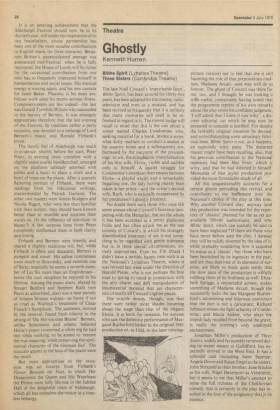Theatre
Ghostly
Kenneth Hurren
Blithe Spirit (Lyttelton Theatre) Three Sisters (Cambridge Theatre) The late Noel Coward's 'improbable farce', Blithe Spirit, has been around for thirty-five years, has beenadapted for the cinema, radio, television and even as a musical, and has been revived so frequently that it is unlikely that many memories will need to be refreshed in regard to it. The merest nudge will recall to mind that this is the one about a writer named Charles Condomine who, seeking material for a book, invites a somewhat dotty medium to conduct. a seance at his country home and is subsequently embarrassed by the outcome of the proceedings: to wit, the ectoplasmic materialisation of his first wife, Elvira, visible and audible only to himself. A quaint struggle for Condomine's attention then ensues between Elvira—a playful wraith and a remarkably beguiling one, the lady having plainly been taken in her prime—and the writer's second wife, Ruth, who is naturally exasperated by her predecessor's ghostly presence.
No doubt there were those who once felt some unease about Coward's facetious tampering with the Hereafter, but on the whole it has been accepted as a pretty gladsome frolic and has often struck me as the one comedy of Coward's in which his strangely disembodied treatment of sex is not something to be regarded with gentle tolerance but is, in these special circumstances, entirely appropriate. Even so, I'm afraid I didn't have a terribly happy time with it at the National's Lyttelton Theatre, where it was revived last week under the direction of Harold Pinter, who is not perhaps the first man to spring to mind in connection with the airy charm and deft manipulation of insubstantial material that are characteristic of nearly all Coward's lighter pieces.
The trouble mostly, though, was that there were rather more shades hovering about the stage than that of the elegant Elvira. It is hard, for instance, for anyone who saw the definitive performance of Margaret Rutherford (either in the original 1941 production or, as I did, in the later moving
picture version) not to feel that she is still haunting the role of that preposterous medium, Madame Arcati—and may well do so forever. The ghost of Coward was there for me, too, and I thought he was looking a trifle rueful, conceivably having noted that the programme reprint of his own remarks about the play omits his confident judgment, 'I will admit that I knew it was witty', a discreet editorial cut which he may now be prepared to concede is justified. For despite the lark ishly original situation he devised, and notwithstanding some amusingly felicitous lines, Blithe Spirit is not, as it happens, an especially witty piece. The departed master might have been recalling, also, that his previous contribution to the National repertory had been Hay Fever, which is witty, and that he had directed it himself. Memories of that joyful production provided the most formidable shade of all.
All this unquestionably accounts for a certain gloom pervading this revival, and contributes to my bafflement over the National's choice of the play at this time. Why another Coward play, anyway (and this production was intended for the repertory of 'classics' planned for the as yet unavailable Olivier auditorium), and why Blithe Spirit, which can scarcely be said to have been neglected ? If there are those who have never before seen the play, 1 daresay they will be mildly diverted by the idea of it, while probably wondering how it acquired its status as a 'classic' ; but those who have been bewitched by its ingenuity in the past, and are thus deprived of its elements of surprise, are likely to think quite testily that the slow pace of the production is wilfully robbing them of its liveliness as well. Elizabeth Spriggs, a resourceful actress, makes something of Madame Arcati, though she necessarily lacks the late Margaret Rutherford's astonishing and hilarious conviction that the part is not a caricature; Richard Johnson misses the light urbanity of Condomine; and Maria Aitken, who plays the impish lady recalled from beyond the grave, is really the evening's only unalloyed enchantment.
Jonathan Miller's production of Three Sisters, widely and favourably reviewed during its recent season at Guildford, has expectedly arrived in the West End. It has a splendid cast (including Janet Suzman, Angela Down and Susan Engel as the sisters, John Shrapnel as their brother, June Ritchie as his wife, Nigel Davenport as Vershinin), but it seems to me that Miller's attempt to mine the full richness of the. Chekhovian comedy that is certainly in the play has resulted in the loss of the poignancy that.is its essence.


































 Previous page
Previous page